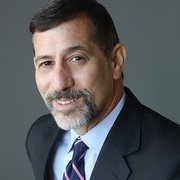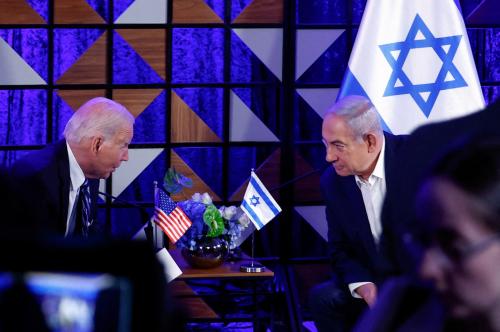

LIVE
Toward reimagined global financial architecture: Progress and challenges12:30 pm EDT - 2:00 pm EDT
Past Event
12:30 pm - 2:00 pm EDT
1775 Massachusetts Ave., NW
Washington, DC
The Saban Center for Middle East Policy hosted a policy luncheon on May 28, 2008 entitled “The Changing Nature of State Sponsorship of Terrorism,” launching a Saban Center analysis paper of the same name. The paper’s author, Daniel Byman, Senior Fellow in the Saban Center and Director of Georgetown University’s Center for Peace and Security Studies, presented a summary of the paper’s findings. Bruce Hoffman, Senior Fellow at the U.S. Military Academy and Professor at the School of Foreign Service at Georgetown University, provided comments. Bruce Riedel, Senior Fellow in the Saban Center, moderated the discussion.
Byman focused his comments on current trends of state sponsorship of terrorism, updating his 2005 book on the same subject, Deadly Connections: States that Sponsor Terrorism, to include recent developments and suggesting policy recommendations to address today’s challenges.
He argued that current conceptions of state sponsors are dated.
Byman described several types of state sponsorship. In particular, “passive sponsorship”—when states take minimal steps against terrorist groups—presents a major concern. He also described the phenomenon of “diversion,” where a country lets a group use its territory in return for promises not to attack domestically. Yemen uses this practice. Additionally, some times states are not able to crack down on terrorism, such as Pakistan in its tribal areas. However, this lack of state capacity is often the result of a deliberate policy not to acquire the necessary means for action.
He also detailed a change in the types of support that terrorist groups receive. Traditionally, states provided groups with arms. However today it is relatively easy to acquire weapons and groups receive other forms of support that are more notable. While states provide training themselves, financial assistance and ideological support are often provided by non-state actors acting within a state.
Byman discussed the difficult challenges provided by current state sponsorship. Increasingly, state action is shaped by domestic concerns and states are unwilling to take stands against popular causes. Additionally, terrorist groups are now more independent from their state sponsors, such as Hezbollah in its interactions with Syria, which means that U.S. pressure against state sponsors has less efficacy and years of increased radicalization have fostered “blow back.”
Byman recommended ways to address state sponsorship, although cautioned against optimism about prospects for success. The current U.S. list of state sponsors is out of date and needs to be modified or abandoned. He also suggested developing international standards defining passive sponsorship. Additionally, he raised the limits of what central governments can do at times and the question of proper treatment of sub-state actors, recommending engagement in appropriate cases.
Hoffman provided a larger context for Byman’s paper, addressing the nature of concerns about terrorism today. There has been much recent rhetoric about the imminent demise of al-Qa‘ida. However, the organization has proved remarkably resilient in the face of U.S. efforts to fight it. Its leadership is easily replenished and it has developed a tremendous capacity to distribute its messaging to its supporters. Although al-Qa‘ida was unsuccessful in its insurgency in Iraq, the organization retains its ability to terrorize.
Hoffman highlighted the importance of studying state sponsorship. Despite the current U.S. emphasis on fighting terrorism around the world, he argued that state sponsorship has been ignored in U.S. policy formulation. Hoffman noted that al-Qa‘ida is coming up on its twentieth anniversary. The vast majority of terrorist groups do not make it through their first decade. However, he argued that those that have passed the 20-year mark provide the biggest challenge to U.S. interests and that one of the major reasons these groups have survived is the support they receive from states. In his opinion, sponsorship might provide the most severe terrorism threat to the United States. During the discussion, however, one participant argued that the biggest direct threat to the United States comes from radicalized individuals born or raised in the West and that state sponsored groups mainly threaten U.S. interests indirectly by endangering U.S. allies. Byman agreed and argued that it was important to continue to develop U.S.-European cooperation regarding direct terror threats to the United States.
Participants questioned the idea of scuttling the list of state sponsors, arguing that this would remove current pressure from state sponsors and suggesting modifying the list to be more accurate about current sponsors while removing the automatic penalties that come with placement on the list. Byman supported removing the automatic penalties but was pessimistic about whether the list could actually be reformed appropriately. He suggested that a non-governmental organization could provide rankings that were more accurate. He also noted that the words “enemies” and “terrorists” are often conflated inappropriately. Although the U.S. definition of terrorism includes attacks on the military, Byman suggested that it was important to distinguish between attacks on soldiers and those on civilians.
One participant asked how the framework of state sponsors impacts the literature on terrorist networks. Both Byman and Hoffman acknowledged that general radicalization among the population plays a role in terrorism but argued that the biggest terrorist successes have been in cases where there was “top-down” direction from within groups. Another participant raised the question of whether the state sponsorship lens was the correct one for approaching al-Qa‘ida. Byman qualified that regarding al-Qa‘ida, state sponsorship is only one of the elements at play. However, in countries where the government is tough on al-Qa‘ida, the group is much more limited in its capabilities. Ultimately, he argued, states are the ones with the major ability to crack down on the organization.



Bruce Riedel
January 16, 2024

Itamar Rabinovich
October 24, 2023

Jeffrey Feltman, Sharan Grewal, Patricia M. Kim, Tanvi Madan, Suzanne Maloney, Amy J. Nelson, Michael E. O’Hanlon, Bruce Riedel, Natan Sachs, Natalie Sambhi, Jaganath Sankaran, Caitlin Talmadge, Andrew Yeo
October 13, 2023